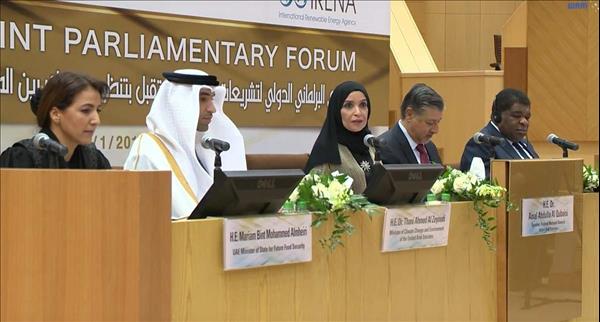
UAE- Global legislators call for clean energy
The FNC-Irena joint forum, held ahead of next week's World Future Energy Summit, focused on the role of global legislators in implementing the SDG - particularly renewable energy deployment and leveraging energy-water-food nexus.
"We all agree that accelerating the development of renewable energy is vital to deliver SDG as defined in Goal seven: Ensure access to affordable, reliable, sustainable and modern energy for all," said Dr Thani bin Ahmed Al Zeyoudi, Minister of Climate Change and Environment.He said the UAE places renewable energy development at the heart of sustainable energy transition. "The UAE Green Agenda 2030, the national strategy for transforming our economy into a low-carbon sustainable economy, defines increasing clean energy development and energy efficiency as one of its strategic pillars."
He highlighted that enhancing global and national efforts for creating effective policies for advancing renewable energy development and fostering private-sector engagement is thus key.Dr Al Zeyoudi said clean energy is what is on top of the UAE's agenda. In January last year, His Highness Sheikh Mohammed bin Rashid Al Maktoum, Vice-President and Prime Minister of the UAE and Ruler of Dubai, unveiled the UAE Energy Plan for 2050, consisting of 44 per cent renewable energy, 38 per cent gas, 12 per cent clean coal and six per cent nuclear energy, while reducing the country's carbon footprint from power generation by 70 per cent and reducing residential energy consumption by 40 per cent.
Martin Chungong, Inter-Parliamentary Union (IPU) Secretary-General, told the forum that as members of the parliamentary community engage with the SDGs, members must also continuously ask themselves: "What difference our work and actions make for the people?""Do they improve the economic wellbeing of the poorest and marginalised?," he asked. He pointed out that events are thus being organised throughout 2018 to promote, exchange and strengthen commitment of parliaments to the implementation of SDGs, adding that private sectors across the globe, also play a vital role in clean energy. "The importance of public-private partnerships is perhaps nowhere more crucial than in the field of renewable energy, where innovation and smart investment are vital to success."
Dr Al Zeyoudi stressed that renewable energy will continue to be promoted under the National Climate Change Plan 2017-2050, adopted by the Cabinet in June 2017.The National Climate Change Plan, a first of its kind in the region, consolidates the country's climate mitigation and adaptation initiatives under one integrated framework, prioritising three areas of climate action: Managing greenhouse gas emissions; developing and implementing climate adaptation programmes in relevant sectors; facilitating private sector-led economic diversification efforts.
"As legislators, you can play a significant role in supporting the advancement of renewable energy technology's and their faster deployment, by contributing to the development of enabling policy frameworks and institutional capacities and encoring public-private partnerships," Dr Al Zeyoudi told the parliament.
| UAE's top renewable energy developments Dr Thani bin Ahmed Al Zeyoudi, Minister of Climate Change and Environment, said that in terms of development, the UAE's notable domestic renewable energy projects include 100-megawatt Shams 1 concentrating solar power plant in Al Dhafra Region of Abu Dhabi, inaugurated in 2013, which is one of the world's largest concentrating solar power (CSP) projects. Another is the 5,000-megawatt Mohammed bin Rashid Solar Park under development in Dubai, which is the largest planned single-site solar park in the world to be operative by 2030. So far, four phases of the park have been announced or completed. There is also Abu Dhabi's Sweihan solar PV project, initially planned for a350 megawatt capacity, then scaled up for more than three times, to a1,170 megawatt capacity, since it received the world's record low bid for photovoltaics at that time, a price of $2.42 cents per kilowatt-hour. |

Legal Disclaimer:
MENAFN provides the
information “as is” without warranty of any kind. We do not accept
any responsibility or liability for the accuracy, content, images,
videos, licenses, completeness, legality, or reliability of the information
contained in this article. If you have any complaints or copyright
issues related to this article, kindly contact the provider above.


















Comments
No comment